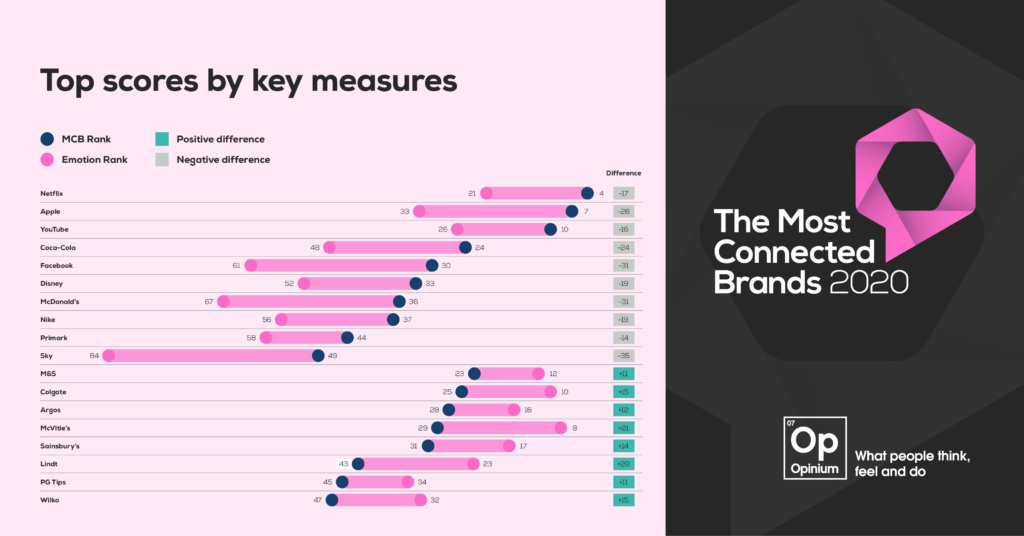Top scores by key measures

Mixed emotions: forging deep and lasting connections with the public
Brand connection, whilst an over-used marketing term, has never been more important. At the time of writing we, as a nation, are in a state of lockdown: scared, uncertain and bored. Looking for brands to offer hope, advice or even just a distraction.
Our Most Connected Brands study offers some clear characteristics for brands that successfully form lasting relationships based on reciprocal emotion and those that don’t.
There are five clear trends when observing which brands engage and which exasperate:
1. Brands entrenched in UK culture have the strongest hold on us
A striking characteristic of the brands that we most connect with is that they are ingrained in UK culture. Interestingly, highly connected brands such as Colgate show this isn’t due to a ‘Buy British’ philosophy, but because we have grown up with these brands. Similarly, the challenge facing the multi-national brands is how you can form intimate, personal and authentic relationships on a global scale.
2. Brands that sell physical products are far more likely to connect with us than those purely in the online-virtual world
Something questioned in our previous MCB studies, was what the intangible nature the term ‘brand’ actually represents. For the young, it is more likely to be the app on their phone or the logo that streams before their favourite programme plays, whereas for older people it will be the store they buy from, or the product they put in the cupboard. The nature of brand also plays a role in our emotional connection. We are far more likely to engage with the chocolate chocolate we buy from Lindt or biscuits from McVitie’s, than the social media site or internet browser we use.
3. Brands that connect tend to deliver hope, happiness or a sense of belonging
What is striking when looking at the data is just how emotional people are about brands. For the leading brands, our relationships are very rarely ambivalent, but are based on instinctive and deeply held emotional markers. For the three most emotionally distant brands in our list (Sky, Facebook and McDonald’s) the kneejerk emotions are anger and disgust. For the three most emotionally connected brands (McVitie’s, Lindt and Wilko) the overriding emotions are that of amusement, happiness and love.
4. People might love your content but that doesn’t mean they love you
An interesting finding is that brands whose core purpose is to entertain and evoke emotion have the largest emotional disconnect with the public. Netflix, YouTube and even Disney, underperform on their ability to connect with consumers. This suggests that the emotion invested in their content isn’t necessarily reflected onto the brands themselves. Sky is the worst culprit due, in part, to keeping content hidden behind a monthly subscription paywall and their decision to pay £1,193 million per annum to acquire Premier League rights to ensure the public would hold their nose and continue subscribing.
5. CSR isn’t something you can buy or badge, it needs to be core to a brand’s DNA to matter
The final trend lies in the importance of corporate reputation. All of the brands that struggle to connect have reputational baggage that weighs them down. For Primark, it lies in fast fashion and sustainability; for Facebook, fake news and hidden influencers; and for McDonald’s, increased focus on healthy living

All of the characteristics teach us something, that to successfully connect with consumers brands need to:
- Develop an authentic persona based on their core purpose, not try to manufacture one
- Create intimate and personalised brand interactions
- Ensure they are clear not just about what products and services they offer but also about which emotion they are tasked with delivering
- Recognise that just because you deliver emotion, doesn’t mean you are banking it
- Recognise how you behave and how you treat employees, the environment and customers won’t just affect your brand today but will become a lasting part of your brand DNA
Download the full report at www.mostconnectedbrands.com





